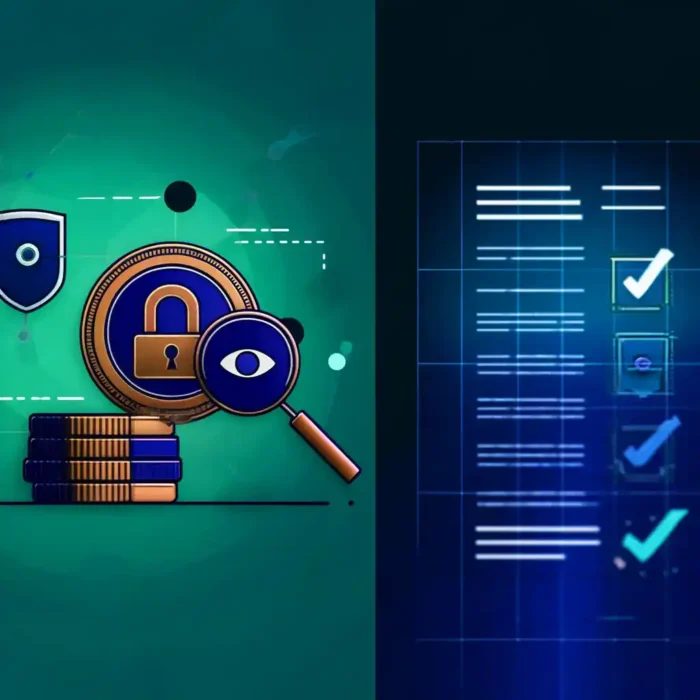As the curtain of night falls, the universe lights up with a million twinkling stars, each one possessing its own unique code of existence, yet shrouded in cosmic anonymity. It’s a beautiful conundrum that mirrors the world of cryptocurrencies, where transactions take place in the vast digital expanse, each carrying a special cryptographic signature, yet silently yearning for the veil of privacy. Welcome to the enigmatic realm of “Privacy Coins” – digital currencies that champion the cause of anonymity. But, as these celestial bodies of finance twirl in the cosmic dance of commerce, they simultaneously raise pressing questions of regulation and compliance. This dance, complex and intricate, demands due diligence to maintain an equilibrium between the two opposing forces. This article takes you on a journey through the fascinating cosmos of privacy coins and due diligence, exploring how they can ensure both anonymity and compliance in the ever-evolving financial universe.
Understanding the Intricacies of Privacy Coins
Understanding privacy coins requires an exploration of the unique characteristics that set them apart from traditional cryptocurrencies. These coins are designed to provide a higher level of anonymity for users, utilizing advanced techniques to obscure transaction details. Due diligence in the use of privacy coins is necessary to ensure this anonymity is maintained, and to remain in compliance with regulatory requirements.
The first step in understanding privacy coins is learning about the technologies they use to enhance privacy. Notable examples include CoinJoin, a method that combines multiple payment orders into one transaction, rendering individual transactions indiscernible. Another is Zero-Knowledge Proofs, a cryptographic method where one party can prove they know a value without revealing that value or conveying any additional information
- CoinJoin - Combines payments from multiple spenders into a single transaction to make it more difficult to determine who paid whom.
- Zero-Knowledge Proofs – Allows a party to prove they know a value, without revealing that value or conveying any additional information.
Due diligence in using privacy coins involves understanding how these technologies work, and how to use them properly to maintain privacy. However, it also involves ensuring compliance with legal and regulatory requirements. For example, some jurisdictions may have restrictions on the use of privacy coins, or specific reporting requirements for transactions involving these coins.
| Coin | Legal Status |
|---|---|
| Monero | Permitted in most countries, restrictions in some |
| Zcash | Permitted in most countries, restrictions in some |
| Dash | Permitted in most countries, restrictions in some |
Is essential for anyone looking to make use of these tools while staying within the bounds of the law. By practicing due diligence, users can enjoy the benefits of increased privacy and security that these coins offer.
Exploring the Importance of Anonymity in Digital Transactions
In the era of digital transactions, the importance of anonymity has escalated exponentially. With the advent of cryptocurrencies such as Bitcoin, Ethereum, and the like, transactions’ privacy has become a cornerstone of the digital economy. But one particular type of cryptocurrency, known as Privacy Coins, takes the goal of anonymity and pushes it even further.
Privacy coins are cryptocurrencies that incorporate technology to provide users with a higher level of privacy compared to other digital currencies. They offer complete anonymity by obscuring the path of a transaction, thereby concealing the identity of the sender and receiver. Notable privacy coins include Monero, Zcash, and Dash.
Table: Key Features of Leading Privacy Coins
| Coin | Anonymity Level | Unique Feature |
|---|---|---|
| Monero | High | Ring signatures for transaction mixing |
| Zcash | Medium | Zk-SNARKS for transaction encryption |
| Dash | Low | CoinJoin for transaction obfuscation |
However, the high level of anonymity offered by privacy coins raises the question of due diligence and compliance with financial regulations. While privacy is a legitimate requirement for most users, it’s also a potential loophole for illicit activities. Hence, it’s paramount to strike a balance between ensuring transactional anonymity and abiding by the necessary regulations. Solutions such as privacy-preserving audits are on the rise, aiming to verify transactions’ legality while still maintaining user privacy.
By fully understanding the importance of anonymity in digital transactions and implementing proper due diligence processes, we can embrace the benefits of privacy coins. In doing so, we can create a more secure and private digital economy.
Compliance Challenges and Potential Solutions in Privacy Coins
The new wave of privacy coins such as Monero, ZCash, and Dash have brought a paradigm shift in the crypto industry. While they promise enhanced anonymity and privacy protections for users, they also pose significant compliance challenges, especially in the context of anti-money laundering (AML) and know-your-customer (KYC) regulations.
These coins employ sophisticated cryptographic techniques to obfuscate the trail of transactions and anonymize users. This essentially makes traditional AML/KYC measures ineffective. Regulatory bodies worldwide, are now grappling with the issue of how to regulate these new types of cryptocurrencies without stifling innovation. Below are some of the prime challenges and potential solutions:
- Increased Anonymity: Privacy coins inherently promote anonymity. This makes it difficult for regulatory bodies and law enforcement agencies to trace transactions and identify users. A potential solution could be the deployment of advanced tracking tools that can analyze transaction patterns and trace back illegal activities.
- Regulation Compliance: Compliance with global financial regulations is another significant challenge. A potential solution could involve creating a framework that regularizes privacy coins without compromising their core value of privacy.
| Privacy Coin | Compliance Challenge | Potential Solution |
|---|---|---|
| Monero | High degree of transactional privacy | Integration of advanced tracking tools |
| ZCash | Shielded transactions | Development of partial disclosure features |
| Dash | PrivateSend feature complicates traceability | Implementation of on-chain analysis methods |
In sum, while privacy coins present a unique set of compliance challenges, they also offer opportunities for innovation in the realm of digital assets. The key lies in balancing the advantages of anonymity and privacy with the need to uphold financial regulations and prevent misuse. It requires a collaborative approach involving technologists, regulators, and the broader community to devise effective and balanced solutions.
Ensuring Due Diligence in Privacy Coin Transactions
While the allure of privacy coins—that is, cryptocurrencies that prioritize anonymity and privacy—is evident, it’s crucial to conduct due diligence when engaging in transactions using these digital assets. This goes beyond just researching the coin’s performance in the market; it involves understanding the coin’s technology, compliance requirements, and potential risks.
Understanding the Technology
Privacy coins leverage various technologies to protect users’ identities and transaction details. Some employ stealth addresses and ring signatures, while others use zero-knowledge proofs. As a participant in privacy coin transactions, it’s important to familiarize yourself with these technologies. This will allow you to understand how your privacy is protected and to what extent.
Compliance Requirements
Despite their privacy-centric features, these coins aren’t beyond the reach of regulatory bodies. Depending on your jurisdiction, you may still be required to disclose your holdings and transactions. Always stay updated with the latest regulations, and consult with a legal expert if needed.
Potential Risks
No investment is without risk, and this applies to privacy coins too. Risks can come from various factors like market volatility, technology vulnerabilities, or regulatory changes.
To assist you in conducting your due diligence, we’ve compiled a simple table showcasing some popular privacy coins and their respective technologies.
| Coin | Technology |
|---|---|
| Monero (XMR) | Ring Signatures, Stealth Addresses |
| Zcash (ZEC) | Zero-Knowledge Proofs |
| Dash (DASH) | CoinJoin |
While privacy coins can provide an added layer of anonymity, they should be treated with the same level of caution and due diligence as any investment. Always educate yourself about the technology, be aware of your compliance requirements, and understand the potential risks involved.
Strategies for Achieving Balance: Anonymity, Compliance, and Privacy Coins
In the world of digital currencies, particularly privacy coins, the debate over maintaining anonymity and ensuring compliance rages on. Privacy coins, such as Monero and Zcash, promise users the ability to transact privately, offering a level of anonymity unparalleled by traditional cryptocurrencies like Bitcoin. However, this anonymity often brings with it complications concerning compliance with financial regulations.
The key to successfully operating within the digital currency space while maintaining compliance comes down to a three-pronged strategy: understanding the technology, understanding the legal landscape, and conducting thorough due diligence.
- Understanding the technology: Privacy coins use sophisticated technologies like ring signatures, stealth addresses, and zk-SNARKs to obfuscate transaction details. By having a comprehensive understanding of these technologies, users and businesses can better navigate the complex digital landscape.
- Understanding the legal landscape: Regulations concerning digital currencies vary greatly by jurisdiction. Some nations have embraced the technology, while others have imposed restrictions or outright bans. It is crucial to stay abreast of the latest regulatory updates in the jurisdictions you operate in.
- Conducting due diligence: This involves verifying the identity of your transaction partners, monitoring transactions for suspicious activity, and reporting any suspect transactions to the relevant authorities. This is crucial to ensuring compliance with AML and CFT regulations.
| Privacy Coin | Privacy Technology | Regulatory Status |
|---|---|---|
| Monero | Ring Signatures, Stealth Addresses | Varies by jurisdiction |
| Zcash | zk-SNARKs | Varies by jurisdiction |
While the benefits of using privacy coins are clear, it is important to balance the need for privacy with the need for compliance. By understanding the technology, staying informed about regulatory changes, and conducting thorough due diligence, users and businesses can enjoy the benefits of privacy coins while minimizing risk and maintaining compliance.
Insights and Conclusions
In the vast, uncharted seas of the digital world, privacy coins stand as a beacon of anonymity. They are an enticing promise of freedom, a secret whisper echoing in the corridors of the Internet. But as we sail these potentially treacherous waters, the compass of due diligence should remain ever in our hands. It is this delicate balance between the call of the unknown and the anchor of accountability that shapes the journey ahead. So, let us navigate this complex landscape together, with a firm grip on the helm of compliance and a steady gaze fixed on the horizon of confidentiality. May our voyage be marked not by fear of the unknown, but by the thrill of discovery and the ceaseless pursuit of a safer, more private digital realm.

